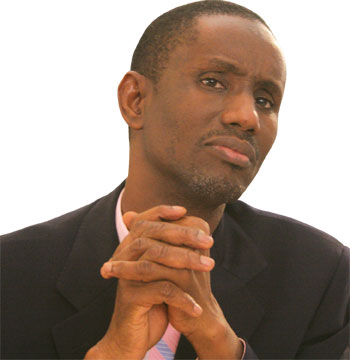There was an open disagreement yesterday between the two leading members of the Petroleum Revenue Special task force, Mallam Nuhu Ribadu and Mr. Steve Oransaye.
While Ribadu submitted the report with some note of caution that the recommendations may be somewhat harsh, Oransaye, on his part, faulted the process leading to the compilation of the report of the committee.
Incidentally, Ribadu, a former boss of the Economic and Financial Crimes Commission (EFCC), is chairman, while Oronsaye, a former Head of Service of the Federation, is the deputy chairman.
Orosanye kicked against the process that led to the compilation of the report being submitted to the president, saying it is flawed and so unimplimentatble.
But Ribadu would not want to hear that, as he accused Orosanye and Bernard Otti, another member of the committee, of compromising their positions and ought to have resigned their membership since they had accepted to be members of the Board of the Nigerian National Petroleum Corporation.
The Task Force was set up in February by President Goodluck Jonathan, following the general protest that greeted the fuel subsidy removal in January, to review Nigeria’s revenues from the oil industry.
A bewildered President Goodluck Jonathan sat glued to his seat while the whole drama played out at the Presidential Council Chambers.
The occasion was the presentations of reports of the three task forces on petroleum industry. The presentations were the committee established to design a new corporate governance code for ensuring full transparency, good governance and global best practices in the NNPC and other oil industry parastatals.
An early indication to what was to come started when the first committee to submit its report, the Special Taskforce on Governance and Controls, had no copy on hand to present to the minister of Petroleum for onward presentation to the President. The chairman of the committee, Dotun Sulaiman, after making his short remarks, stood up to present a copy to the minister, only to find out that the copies that were brought to the Presidential Villa were not at the Council chambers. A file had to be given him to present an empty file to the minister pending when a copy would be brought for onward presentation to the president who was to collect the three reports from the minister at once.
But the other committee on National Refineries, chaired by Kalu Idika Kalu, submitted it’s report without any hitch.
But then the main drama started when Mallam Ribadu submitted his report, where he recommended a stricter regulation of the sector, especially as regards the collection of revenue from oil companies.
Meanwhile, Ribadu has accepted the report submitted yesterday, as being the same as the one that was leaked to the press several days earlier.
Submitting the report, the former EFCC boss called for a coherent funding process for oil projects, so as to free up monies tied up in Joint Venture Companies (JVC).
He also advised government against the use of traders to market the country’s crude oil, insisting that the country ought to be selling directly to buyers outside the country.
He urged the Federal Government to intensify efforts to improve collections of oil revenues; stressing that oil firms in Nigeria were making huge profits, yet were investing their profits largely outside the country and owing Nigeria royalties.
He described the theft of crude oil in the country as an embarrassing national tragedy that must be stopped, while the insecurity in Niger Delta should be addressed.
The committee also recommended the need to strengthen the Department of Petroleum Resources (DPR).
Ribadu, in his submission, harped on the need for integrity to be able to execute the reforms desired in the oil sector.
He said, “You are doing well in fighting corruption, but we need to do more. A lot depends on that. We congratulate you on the steps you have taken and we are proud to be able to contribute. Carrying out reforms requires integrity, and I say that from personal experience. We commend you and wish you successes.
“Mr. President our assignment is essentially to enhance government revenue in proving transparency and accountability, and to help you fight corruption in this industry. Therefore, in the course of the assignment, our work was extensive, our findings detailed, and our recommendations far-reaching in these various issues covered in our terms of reference.”
Comments
comments












Recent Comments